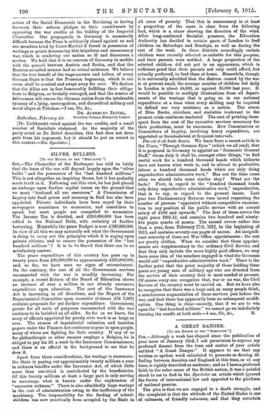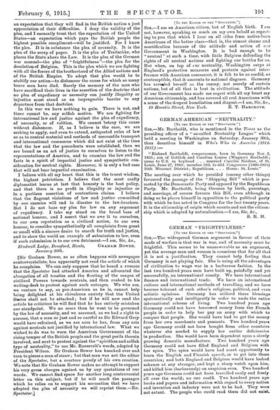A GREAT DANGER.
[To rss Rams or 'us SPiCTAT011.1
Sva,—Although a week has elapsed since the publication of
your issue of January I ask permission to express my profound dissent from the tone and matter of your article entitled "A Great Danger." It appears to me that any written or spoken word calculated to promote or develop ill- feeling between America and England at this time, or at any time, is rightly described as madness ; and as I have a profound faith in the sober sense of the British nation, it was a painful shock to me to find in the Spectator an article which ignored the forum of international law and appealed to the platform of national passion.
The plea is that we are engaged in a death struggle, and the complaint is that the attitude of the United States is one of calmness, of friendly mOnmess, and that they entertain an expectation that they will find in the British nation a just appreciation of their difficulties. I deny the validity of the plea, and I earnestly trust that the expectation of the United States—an expectation which pays the British people the highest possible compliment—will be justified. For I know the plea. It is in substance the plea of necessity. It is the plea of the scrap of paper. It is the plea of Treitschke, who places the State above the Law. It is the plea of the German war manual—the plea of " frightfulness "—the plea for the desolationof Belgium. This is the plea which we are fighting with all the forces of the brotherhood of the Allied nations and of the British Empire. To adopt that plea would be to stultify our action—to dishonour the cause for whieh so many brave men have died. Surely the memory of the men who have sacrificed their lives in the assertion of the doctrine that no plea of expediency or necessity can justify illegality or injustice must stand as an impregnable barrier to any departure from that doctrine.
-In this war we have nothing to gain. There is not, and there cannot be, any selfish motive. We are fighting for international law and justice against the plea of expediency, of necessity, or of volition. We cannot betray this cause without dishonour. If, as I believe is the case, we are seeking to apply, and even to extend, antiquated rules of law so as to control material and methods of mercantile transport and international commerce which did not exist at the time that the law and the precedents were established, then we are bound as an act of justice to ourselves to listen to the representations of America, and to examine the law and the facts in a spirit of impartial justice and sympathetic con- sideration for neutral rights. Moreover, it is only a bad case that will not bear impartial examination.
I believe with all my heart that this is the truest wisdom, the highest patriotism. I believe that the most crafty diplomatist learns at last that honesty is the best policy, and that there is no profit in illegality or injustice or in a partisan assertion of contentious claims. I believe that the flagrant violations of law and justice committed by our enemies will end in disaster to the law-breakers. But I do not base my plea for law on any argument of expediency. I take my stand on the broad base of national honour, and I assert that we owe it to ourselves, to our own reputation as a civilized nation, to our own honour, to consider sympathetically all complaints from great or small with a sincere desire to search for troth and justice, and to show the world an example of submission to law, even if such submission is to our own detriment. —I am, Sir, Ace,
Studwell lodge, Droxford, Hants, G rtausar Bowan. January 50th.
[Sir Graham Bower, as so often happens with newspaper controversialists, has apparently not read the article of which be complains. We can only suppose that he beard a rumour that the Spectator had attacked America and advocated the abrogation of all treaties and the flouting of the usages of civilized Powers towards neutrals, and then rushed to his writing-desk to protest against such outrages. We who are, we venture to say, as pro-American as he is, cannot help being delighted at his chivalrous anxiety that the United States shall not be attacked ; but if be will now read the article he criticizes he will find that he has entirely mistaken our standpoint. We no more than he want to be governed by the law of necessity, and we assumed, as we bad a right to assume, that a man so just and so careful as Sir Edward Grey would have refrained, as we are sure he has, from any acts against neutrals not justified by international law. What we wished to do was to warn the American Government of the rising temper of the British people and the great perils therein involved, and next to protest against the "spiritless and selfish type of neutrality," to use Mr. Roosevelt's words, adopted by President Wilson. Sir Graham Bower has knocked over and torn to pieces a man of straw; but that man was not the editor of the Spectator, but a creature purely of his own creation. We note that Sir Graham Bower makes no attempt to support his very gross charges against us by any quotations of our words. We cannot find space for another long controversial letter on this subject, but if be will mark the passages which he relies on to support his accusation that we have adopted the plea of necessity we will reprint them.—En. Spectator.]







































 Previous page
Previous page